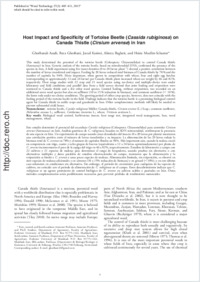Host Impact and Specificity of Tortoise Beetle (Cassida rubiginosa) on Canada Thistle (Cirsium arvense) in Iran
- Asadi, Ghorbanali Department of Agronomy, Faculty of Agriculture, Ferdowsi University of Mashhad, Iran
- Ghorbani, Reza Department of Agronomy, Faculty of Agriculture, Ferdowsi University of Mashhad, Iran
- Karimi, Javad Department of Plant Protection, Faculty of Agriculture, Ferdowsi University of Mashhad, Iran
- Bagheri, Alireza Department of Agronomy, Faculty of Agriculture, Ferdowsi University of Mashhad, Iran
- Müller-Schärer, Heinz Biologie - Ecologie & Evolution, University of Fribourg, Switzerland
-
01.06.2013
Published in:
- Weed Technology. - 2013, vol. 27, no. 2, p. 405–411
Biological weed control
herbivorous insects
host range test
integrated weed management
Iran
weed management
wheat
English
This study determined the potential of the tortoise beetle (Coleoptera: Chrysomelidae) to control Canada thistle (Asteraceae) in Iran. Genetic analysis of the tortoise beetle, based on mitochondrial DNA, confirmed the presence of the species in Iran. A field experiment using five insect densities (0 to 20 larvae plant−1) showed a positive correlation between the number of larvae transferred and impact. Feeding by 20 larvae reduced total biomass of Canada thistle by 78% and the number of capitula by 94%. More important, when grown in competition with wheat, four and eight egg batches (corresponding to approximately 12 and 24 larvae) per Canada thistle plant increased wheat ear weight by 46 and 82%, respectively. Host range studies with 22 crop and 21 weed species using no-choice and multiple-choice tests under laboratory and field conditions and parallel data from a field survey showed that joint feeding and oviposition were restricted to Canada thistle and a few other weed species. Limited feeding, without oviposition, was recorded on an additional seven weed species but also on safflower (10 to 15% reduction in biomass), and common sunflower (< 10%); the latter only under no-choice conditions. The growing period of either crop species, however, does not coincide with the feeding period of the tortoise beetle in the field. Findings indicate that the tortoise beetle is a promising biological control agent for Canada thistle in arable crops and grasslands in Iran. Other complementary methods will likely be needed to prevent substantial yield losses.
- Faculty
- Faculté des sciences et de médecine
- Department
- Département de Biologie
- Language
-
- English
- Classification
- Biological sciences
- License
- License undefined
- Identifiers
-
- RERO DOC 32943
- DOI 10.1614/WT-D-12-00085.1
- Persistent URL
- https://folia.unifr.ch/unifr/documents/303319
Statistics
Document views: 138
File downloads:
- hms_his.pdf: 220
